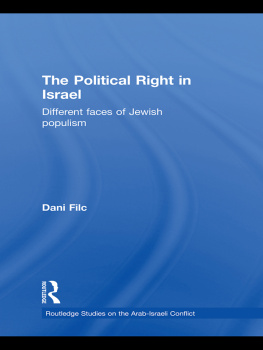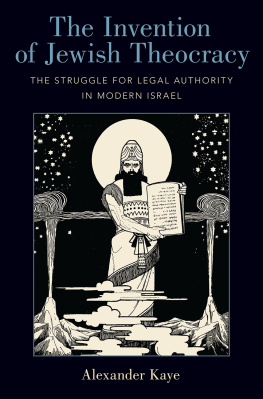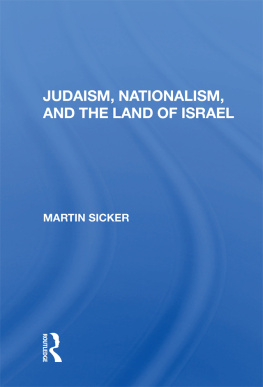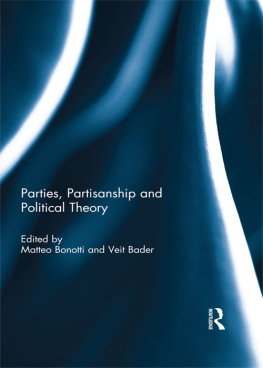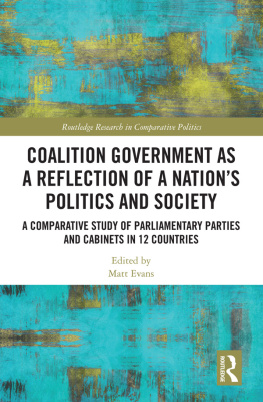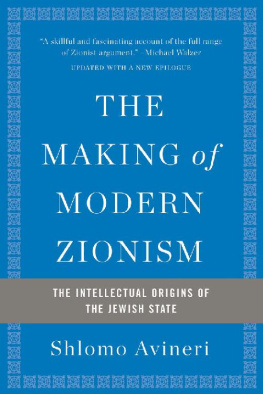Tradition
and
Politics
The Religious Parties
of Israel
Gary S. Schiff
Wayne State university Press Detroit
Copyright 1977 by Wayne State University Press, Detroit, Michigan 48202. All material in this work, except as identified below, is licensed under a Creative Commons Attribution-NonCommercial 3.0 United States License. To view a copy of this license, visit https://creativecommons.org/licenses/by-nc/3.0/us/.
All material not licensed under a Creative Commons license is all rights reserved. Permission must be obtained from the copyright owner to use this material.
The publication of this volume in a freely accessible digital format has been made possible by a major grant from the National Endowment for the Humanities and the Mellon Foundation through their Humanities Open Book Program.
Library of Congress Cataloging in Publication Data
Schiff, Gary S 1947
Tradition and politics.
(The Modern Middle East series; v. 9)
Bibliography: p.
Includes index.
1. Political parties Israel History.
2. IsraelPolitics and government. 3. Religion and state Israel History. 4. Religious Zionism History. I. Title. II. Series.
JQ1825.P37S34 329.95694 77-5723
ISBN 978-0-8143-4389-0 (paperback); 978-0-8143-4390-6 (ebook)
Wayne State University Press thanks the Jewish Council for Public Affairs and the Israel Consulate, New York for their generous permission to reprint material in this book.
Exhaustive efforts were made to obtain permission for use of material in this text. Any missed permissions resulted from a lack of information about the material, copyright holder, or both. If you are a copyright holder of such material, please contact WSUP at .
http://wsupress.wayne.edu/
To Shellie
Contents
Foreword
Tradition and Politics is the first analysis of religion and politics in Israel that does not get lost in theological wrangle. The religious parties are the self-appointed custodians of religion in the Jewish state. However, they espouse divergent ideologies, so that, apart from their opposition to the secularization of the society and the state, they also diverge in their politics. In a word, the mode of analysis that Gary S. Schiff has chosen is well calculated to reveal how the prevalence of religious ideologies has reinforced the divisions within Israels multiple-party system.
The value of the book inheres in its broad perspective. The author traces the religious parties from their origins in Europe early in the twentieth century, in response and in reaction to the rise of Zionism, and their transplantation to Palestine, their adaptation to the new realities, their participation in the quasi-government of the Jewish community under the British Mandate, and their unfolding roles after independence. He characterizes Mafdals operational ideology as the nationalization of religion and that of Agudat Yisrael and its labor offshoot as one of institutionalized separatism. In his judgment, this helps explain why, after the creation of the Jewish state, those religious parties which had integrated Zionism into their ideologies merged into a single party and became full participants in the new society, and why those which persisted in their rejection of Zionism in the main preserved their original divisions and, after some initial limited attempts at affecting social policy, largely reverted to sectarian pursuits.
Because Mafdal, and its antecedent parties, have taken part in every coalition government in sovereign Israel, the book provides a fresh perspective on the functioning of the political system. It also illuminates the impact of the religious parties on educational development, and incidentally proves true the assumption that the religious parties are basically discrete entities. But, above all, the work is valuable for the light that it sheds on the varying responses of the religious parties, which by definition uphold tradition, to the profound pressures of change that inescapably have accompanied the building of a modern society.
In a word, Tradition and Politics furnishes the reader a mode of understanding the most profound ideological controversy in Israel over the final structure of its polity and its society.
J. C. Hurewitz
Director
Middle East Institute
Columbia University
Acknowledgments
Only when sitting down to write the acknowledgments of a book of this scope, involving years of research and writing, can one begin to appreciate the number of people who in one way or another contributed to its ultimate publication.
Firstly, I owe a debt of gratitude to Professor J. C. Hurewitz of Columbia University, whose guidance and assistance at every stage of this book, from germination of the original idea to final publication, is reflected in his excellent Foreword. As Director of Columbias Middle East Institute, Professor Hurewitz was also instrumental in having the book accepted into its well-respected Modern Middle East Series, and in having an earlier manuscript edited by the Institutes own masterful editor, the late Wayland Schmitt. Professor Hurewitzs predecessors as director, Professors Charles Issawi and John Badeau, were also helpful at various points, as were Professors Douglas Chalmers, Amitai Etzioni, and Arthur Hertzberg, who read earlier drafts, as did Mr. Zvi Yaron of Jerusalem. Numerous students and various colleagues of mine at City College of the City University of New York and at Yeshiva University also provided inspiration and encouragement.
In a more practical sense, the Foreign Area Fellowship Program of the Social Science Research Council, the American Council of Learned Societies, and the Ford Foundation made possible the year and a half of field research and subsequent preliminary write up of the findings. The Danforth Foundation, and particularly Miss Lillie Mae Rose, were also helpful in overcoming some of the fiscal hurdles, as was the Woodrow Wilson Foundation.
In the course of my research in Israel, the cooperation of the staffs of the Hebrew University-Jewish National Library, the Central Zionist Archives, and the Religious Zionist Archives (especially Rabbi Tzvi Reich) was much appreciated. In New York the staffs of the Zionist Archives and the Columbia University libraries were of assistance.
My gratitude must also be expressed to the personnel of the religious parties themselves: to their ministers and members of Kneset who consented to be interviewed at length; to their staffs at the Kneset (particularly to Mr. Yaakov Eliav of Mafdal); and to the staffs of the parties world and national headquarters and branches (especially to Mr. Moshe Gewirtz of the Agudat Yisrael world headquarters and to Mr. Yitzhak Goldschlag of the world center of Mizrahi-ha-Poel ha-Mizrahi).
My thanks also go to my Wayne State University Press editor, Mrs. Jean Owen, who doggedly persisted through my undecipherable hieroglyphics, interminable teeth-breaking transliterations, and sundry linguistic idiosyncracies to produce such a clear and readable text. Thanks also to Mrs. Saundra Blais for assistance with the index.
Finally, I am pleased and proud to express my thanks to my family for all their help: to Jeremy, who was literally born into this book, and to Rina, who came in at the tail end, for being so patient and cooperative while their parents were working on the book; and mostly to my dear wife Shellie, who served devotedly as sole typist, meticulous research assistant, chief editor, objective critic, and constant inspiration. While I willingly shoulder the full responsibility for this book, this statement can only be understood in light of her enormous and unique contribution.


